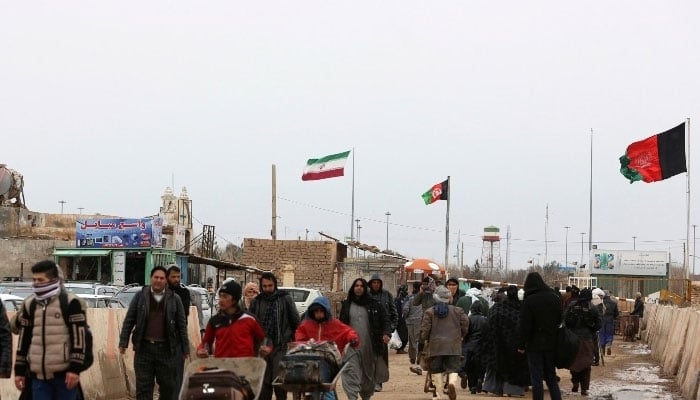Afghan interim govt not inclusive, says Iran
TEHRAN/GENEVA: Iran charged Monday that the Taliban´s interim government announced last week in neighbouring Afghanistan is not representative of the country´s population.
It "is certainly not the inclusive government that the international community and the Islamic Republic of Iran expect," said Foreign Ministry Spokesman Said Khatibzadeh.
"We really have to wait and see how the Taliban respond to international demands," he added, speaking at a news conference in Tehran. Iran, which shares a more than 900 kilometre border with Afghanistan, already hosts nearly 3.5 million Afghans and fears a new influx of refugees.
Iran has had a contentious relationship with the Taliban during their 1996-2001 rule of an Islamic Emirate of Afghanistan, which it has never recognised. Tehran had nevertheless seemed to be moving towards a rapprochement with the Taliban in recent months.
Meanwhile, the UN rights chief said on Monday that the Taliban are breaking their promises on women´s rights and inclusivity in Afghanistan and she also criticised violence against protesters and alleged reprisal killings.
Michelle Bachelet said there were “credible allegations” former members of the security forces had been killed, and some people who worked for previous administrations had been detained and later “found dead”. She also highlighted allegations of house-to-house searches of former officials, raids on civil society groups and “increasing violence against protesters and journalists”.
She told the UN Human Rights Council in Geneva she was “dismayed by the lack of inclusivity of the so-called caretaker cabinet, which includes no women and few non-Pashtuns”.
The announcement of the government of male loyalists last week was a key step in the Taliban´s consolidation of power over Afghanistan, following a military victory that saw them oust the US-backed administration on August 15.
In an update to the council on the rights situation, requested during a special session last month, Bachelet stressed that most Afghans were eager to see an end to decades of conflict and division. “They long for peace and stability in a country where they and their children can prosper,” she said.
And she highlighted promises by the Taliban to install a more moderate brand of rule including protecting women’s rights. “In contradiction to assurances that the Taliban would uphold women’s rights, over the past three weeks women have instead been progressively excluded from the public sphere,” she said.
-
 Natalie Dormer's Reaction To Sarah Ferguson's Epstein Links Resurfaces After 'The Lady' Release
Natalie Dormer's Reaction To Sarah Ferguson's Epstein Links Resurfaces After 'The Lady' Release -
 Did You Know Famous Windows 10 Background Was Shot In Real Life? Here's Story
Did You Know Famous Windows 10 Background Was Shot In Real Life? Here's Story -
 Pete Davidson's Baby Mommy Elsie Hewitt Reveals Why She 'hated' Being Pregnant
Pete Davidson's Baby Mommy Elsie Hewitt Reveals Why She 'hated' Being Pregnant -
 Harry, Meghan Show Royal Family How To Make Impact Without Public Money
Harry, Meghan Show Royal Family How To Make Impact Without Public Money -
 Hillary Clinton Set For Deposition Before House Committee Today In Jeffrey Epstein Investigation Case
Hillary Clinton Set For Deposition Before House Committee Today In Jeffrey Epstein Investigation Case -
 Samsung Galaxy S26 Ultra Debutes With Display That Blocks Side Viewers
Samsung Galaxy S26 Ultra Debutes With Display That Blocks Side Viewers -
 Fans In Shock As 'Smiling Friends' Creators End Cult-favourite Sitcom On Adult Swim: 'They Did It On Purpose'
Fans In Shock As 'Smiling Friends' Creators End Cult-favourite Sitcom On Adult Swim: 'They Did It On Purpose' -
 Meghan Markle Accused Of Mimicking Kate’s Iconic Style On 'pseudo Royal Tour'
Meghan Markle Accused Of Mimicking Kate’s Iconic Style On 'pseudo Royal Tour' -
 Social Media Addiction ‘like Smoking’: Mumsnet Calls For Under-16s Ban With Cigarette-style Warnings
Social Media Addiction ‘like Smoking’: Mumsnet Calls For Under-16s Ban With Cigarette-style Warnings -
 Andrew Mountbatten, Virginia Giuffre's Photos Attached To Buckingham Palace Gates
Andrew Mountbatten, Virginia Giuffre's Photos Attached To Buckingham Palace Gates -
 Everything We Know About Bruce Willis Frontotemporal Dementia
Everything We Know About Bruce Willis Frontotemporal Dementia -
 Singapore's Grab Plans AI-driven Expansion And New Services To Boost Profit By 2028
Singapore's Grab Plans AI-driven Expansion And New Services To Boost Profit By 2028 -
 Adele Reveals How She 'snapped Out Of' Sever Postpartum Depression
Adele Reveals How She 'snapped Out Of' Sever Postpartum Depression -
 ‘Chinamaxxing’ Explained: Inside Viral Gen Z Trend Taking Over TikTok And Instagram
‘Chinamaxxing’ Explained: Inside Viral Gen Z Trend Taking Over TikTok And Instagram -
 Fears Erupt About Sarah Ferguson Pulling A ‘Harry’ While Sitting On A King’s Ransom: ‘Her Leverage Still Stands’
Fears Erupt About Sarah Ferguson Pulling A ‘Harry’ While Sitting On A King’s Ransom: ‘Her Leverage Still Stands’ -
 Lisa Rinna Slams Andy Cohen For His Below The Belt Move: 'So Shady'
Lisa Rinna Slams Andy Cohen For His Below The Belt Move: 'So Shady'




